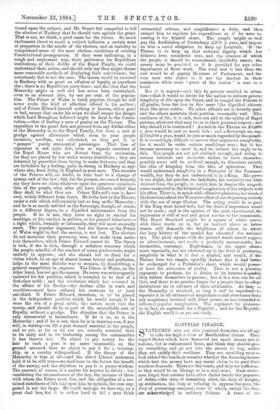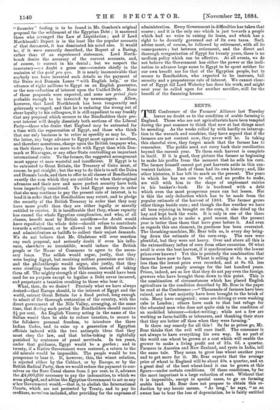EGYPTIAN FINANCE.
STATESMEN who are also practical financiers are all-apt to take too high a view of Bondholders' claims. They regard States which have borrowed too much money notas nations, but as embarrassed firms, and think they should give up everything and go out into the streets to bog, rather than not satisfy their creditors. They are unwilling even. to look behind-the bonds, or examine whether the financing -homes which lent the money have any moral claim to be paid their usurious demands. There are the bonds, and they are sufficient, as they would be on 'Change or in a civil court. Such states- men forget that nations have other duties beside the payment of debts,—the duty of remaining alive, the duty of dteeping, up civilisation, the duty of refusing to oppress the poor, -the duty of preventing conquest, none of which, except the 6ra, are acknowledged in • ordinary debtors. A trace of the " financier " feeling is to be found in Mr. Closchen's original proposal for the settlement of the Egyptian Debt ; it mastered those who arranged the Law of Liquidation ; and if Lord Northbrook's Report is in the least like the popular accounts of that document, it has dominated his mind also. It would be, if it were correctly described, the Report of a Baring, rather than of an experienced statesman. Lord North- brook denies the accuracy of the current accounts, and, of course, is correct in his denial ; but we suspect the inaccuracy—no doubt a gross one—consists chiefly in the omission of the quid pro quo. It is nearly inconceivable that anybody can have invented such details as the payment of the Daira and Domain Loans "with English help," or the advance of eight millions to Egypt on an English guarantee, or the non-reduction of interest upon the Unified Debt. None of those proposals were expected, and none are primd facie probable enough to be invented by newsmongers. Allow, however, that Lord Northbrook has been temporarily and grievously wronged, and that he is enduring the wrong out of sheer loyalty to his colleagues, it is still expedient to say frankly that any proposal which secures to the Bondholders their pre- sent interest will deeply dissatisfy both sections of the Liberal Party—those who desire that England may be entrusted for a time with the regeneration of Egypt, and those who think that our only business is to retire as speedily as may be. To the latter, any large advance to Egypt must appear a needless, and therefore monstrous, charge upon the British taxpayer who, on their theory, has no more to do with Egypt than with Den- mark or Nicaragua, or any other State controlling an important international route. To the former, the suggested arrangement must appear at once wasteful and insufficient. If Egypt is to be entrusted to Great Britain, the Treasury of Cairo must, of course, be put straight ; but the way to do this is to sell the Daira and Domain lands, and then to offer to all classes of Bondholders exactly the sum which they are entitled to when their original advances and their new and more perfect security have both been impartially considered. To lend Egypt money in order that she may continue to pay the present rate of interest, is to lend it in order that the Bondholders may extort, and to pledge the security of the British Treasury in order that they may have more profit than they are either legally or morally entitled to receive. It is insufferable that they, whose rapacity has caused the whole Egyptian complication, and who, of all classes, benefit most by British sacrifices—for Arabi would have repudiated the whole debt—should refuse to contribute towards a settlement, or be allowed to use British Generals and administrators as bailiffs to collect their unjust demands. We do not believe that Mr. Gladstone will ever sanction any such proposal, and seriously doubt if even his influ- ence, elsewhere so irresistible, would induce the British people or the House of Commons to agree to the neces- sary loans. The selfish would argue, justly, that they were buying Egypt, but receiving neither possession nor title ; and the philanthropic would argue, also justly, that they were rivetting burdens on the fellaheen, instead of taking them off. The mighty strength of this country would have been used for no purpose except to legalise a Debt never incurred, and perpetuate a taxation crushing to those who bear it. What, then, do we desire? Precisely what we have always desired—that Europe should, in the interest of Egypt and the world, entrust Great Britain for a fixed period, long enough to admit of the thorough restoration of the country, with the direct government of the Nile Valley, arranging, at the same time, that during such period the Bondholders should receive per cent. An English Viceroy acting in the name of the Sultan would then be able to reduce taxation, to secure to the fellakeen personal freedom, to introduce the three Indian Codes, and to raise up a generation of Egyptian officials imbued with the two antiseptic ideas that they must obey the law, and that bribe-taking is rightfully punished by sentences of penal servitude. In ten years, under that guidance, Egypt would be a garden ; and in twenty, if a Native Government were restored, a return to the old misrule would be impossible. The people would be too prosperous to bear it. If, however, this, the wisest solution, is rejected either by the Cabinet, or by Europe, or by the British Radical Party, then we would reduce the payment to our- selves on the Suez Canal shares from 5 per cent. to 3, advance the £4,000,000 necessary to pay the indemnities, to which we seem pledged, and advise the Egyptian Government to act as any other Government would,—that is, to abolish the International Courts, which are not protected by Treaty, and to pay its creditors, ourselves included, after providing for the expenses of administration. Every Government in difficulties has taken that course ; and it is the only one which is just towards a people which had no voice in raising its loans, and which has a right to be decently governed out of its own taxes. Such advice must, of course, be followed by retirement, with all its consequences ; but between retirement, and the direct and thorough reorganisation of Egypt for twenty years, there is no medium policy which can be effective. At all events, we do not believe the Government has either the power or the incli- nation to advance large sums to Egypt to be spent neither for our own benefit nor for that of the Egyptian people, but to secure to Bondholders, who expected to be insecure, full security and a preposterous rate of interest. We cannot clear- out of Egypt till Lord Wolseley has done his work, and might next year be called upon for another sacrifice, still for the benefit of the financing houses.



































 Previous page
Previous page